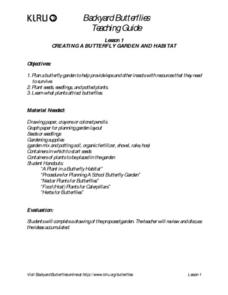Consortium for Ocean Science Exploration and Engagement (COSEE)
Plankton to Penguins: Antarctic Food Web
A well-written lesson plan, second in a series of four, gets high schoolers exploring how the Antarctic food web is impacted by climate change and the associated melting of polar ice sheets. It begins with a PowerPoint presentation about...
California Academy of Science
Sustainable Food Solutions: Weighing the Pros and Cons
A growing demand for sustainable food systems comes from schools and even some cities. So what are some solutions? Scholars consider four different ways to approach sustainable food solutions and list the pros and cons of each. The fifth...
Consortium for Ocean Science Exploration and Engagement (COSEE)
Carbon Dioxide & Krill: Impacts
What effects do temperature and carbon dioxide levels have on the zooplankton of Antarctica? This concluding lesson plan in a short unit on climate change and the ocean helps environmental scientists answer these questions. After...
British Council
Plastic-Free Is Not Easy
Paper or plastic? Scholars discuss a worksheet containing grocery photos in which consumers were challenged to buy items without plastic wrapping or containers. Learners rank the food items by the need for packaging, such as a banana,...
Education Outside
Papermaking
Imagine recycling food scraps and using them to make paper. The directions are all here in a seven-page packet that details several paper-making strategies.
Polar Trec
Bioaccumulation of Toxins
In 2015, Peter Cook found that sea lions with high levels of exposure to toxins suffered permanent brain damage if they survived at all. Scholars learn about the accumulation of toxins at various levels of the food chain. Using...
Berkshire Museum
The Three Life-Giving Sisters: Plant Cultivation and Mohican Innovation
Children gain first-hand experience with Native American agriculture while investigating the life cycle of plants with this engaging experiment. Focusing on what the natives called the Three Sisters - corn, beans, and squash - young...
Berkshire Museum
Backyard Rocks
You don't have to travel far to learn about rocks, just step outside, pick up a stone, and begin investigating. After taking a class walk around the school grounds collecting rocks, young scientists practice their skills of observation...
August House
Go to Sleep, Gecko
Use this multidisciplinary lesson to delve into these subjects: English language arts, math, science, drama, and character education. After reading, discussing, and making interpretations about Go To Sleep, Gecko!: A Balinese Folktale by...
NOAA
Where There's Smoke, There's ...
A remotely operated vehicle approaching a volcano was engulfed by molten sulfur where the plumes of fluids contained the highest concentrations of aluminum ever recorded. This isn't science fiction or an April fools joke, though it did...
Channel Islands Film
Natural Resources, and Human Uses of Plants and Animals
As part of their study of the restoration projects on Santa Cruz Island, class members demonstrate their understanding of the connections among plant life, animals, and the actions of humans by crafting a model that reveals these...
Curated OER
The Global Precipitation Measurement Mission (GPM) Lesson
Introduce your class to one of the ways that technology is benefiting humanity. The Global Precipitation Measurement Mission involves the data collected by nine satellites from different countries with a united focus on studying world...
Education Outside
Honey Tasting
Young scientists will be abuzz as they sample and compare the tasty treats produced by Apis Mellifera.
NOAA
Fishy Deep-sea Designs!
Oceans represent more than 80 percent of all habitats, yet we know less about them than most other habitats on the planet. The instructor introduces the epipelagic, mesopelagic, bathypelagic, twilight, and midnight zones in the ocean....
Science 4 Inquiry
The Ups and Downs of Populations
As the reality of population decline across many species becomes real, pupils learn about the variables related to changes in populations. They complete a simulation of population changes and graph the results, then discuss limiting...
PBS
Creating a Butterfly Garden and Habitat
This complete set of instructions for creating your very own butterfly garden and habitat is so cool! With some seeds and the handy resources in this activity, you and your class will be able to determine which type of habitat is best...
Teach Engineering
Clean it Up!
Harness the power of bacteria. Scholars see how using organisms that exist in nature can help solve human problems in the process known as bioremediation. They research and discuss several successful examples, such as using oil-eating...
Teach Engineering
Photosynthesis—Life's Primary Energy Source
Wouldn't it be great if you could produce your own food? Scholars learn about the processes of photosynthesis and cellular respiration in plants. They consider how to use photosynthesis as a model of an efficient system and how to apply...
Curated OER
The Chesapeake Bay in Captain John Smith's Time
When Captain John Smith visited the Chesapeake Bay in the summer of 1608, what types of animals and habitats did he encounter? Your young historians will analyze primary source documents to answer this question, as well as compare the...
Other popular searches
- Science Project Food Apples
- Science Project Food Chain
- Science Project Food Waste
- Science Project Food Rice
- Food Science Fair Projects
- Science Project Food Decay
- Science Projects Food Chain




















